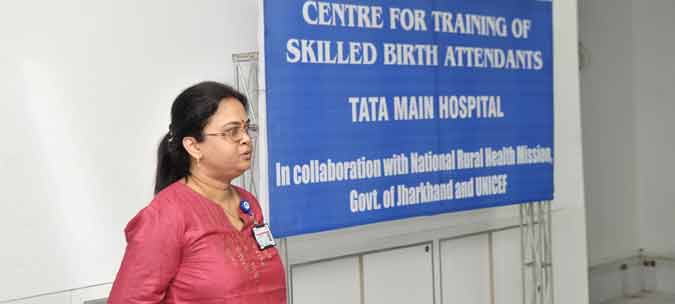Find a Doctor
The doctors at Tata Main Hospital are here to cater to all your needs based on their specialties.

Apart from providing medical care to patients, TMH regularly extends medical services to the community in and around its areas of operations in Jharkhand, West Bengal, Odisha and Chhattisgarh.
Helping the community is a way of life at TMH as we visualize and execute programmes for the community.
Tata Steel was the first in the corporate sector to launch its family planning program in 1951. Doctors from TMH have been closely associated with family welfare and family planning initiative together with TSRDS, Tata Steel. The program is integrated with maternal and child welfare schemes and its success is attributed to the close working of TMH with NGOs.

The eye department of TMH, Indian Red Cross Society and Ram Manohar Lohia Seva Sansthan along with other NGOs have been conducting free eye camps for more than 20 years. The needy and poor are operated free of cost. Small incision cataract surgery (sutureless) with intra ocular lens implantation is done. The camps are conducted weekly every winter. Free medicines and glasses are distributed.
Together with Roshni, an NGO, eye donation and cornea transplantation to cure blindness is done. Training of school teachers for visual screening of children is regularly carried out.
TMH began its HIV/AIDS initiatives in the early 1990s, both in the workplace and community. The senior management established the Nodal Centre for AIDS with the task of bringing focused efforts across Tata Steel as well as working with other Institutions, Governmental & industrial agencies. Apart from conducting AIDS awareness programmes, TMH started HIV counseling and testing facility.
For follow up, care and support to HIV+ persons the following was done. The Sneh Kendra, established in 2005, lent support to People Living with HIV/AIDS (PLWHA). The Preventing Parent to Child Transmission (PPTCT) program for HIV+ pregnant women was started at TMH.
The HIV/AIDS initiatives has been audited and recognized by the prestigious Deming Award Application in 2008 and Sneh Kendra has been conferred the TERI Corporate Award for HIV/AIDS initiatives in the community in 2008.
TMH has been the first to introduce HIV-AIDS initiatives:
Lifeline or Jeevan Rekha Express, the world’s first mobile rail hospital, is a joint collaboration between the Impact India Foundation, the Rajiv Gandhi Foundation and the Indian Railways. On 16 July, 1991 this train was flagged off for the first time. This train serves a number of regions that do not have access to advanced medical care.
The Lifeline Express is equipped with a modern operation theatre, which offers diagnostic, medical and surgical treatment for prevention and curative interventions for the handicapped. Tata Steel is the only corporate house in the country to sponsor the Lifeline Express for the highest number of times across the states of Bihar, Jharkhand, Odisha, West Bengal and Chhattisgarh. Till date, though this train, TMH has reached out to more than a lakh people living in rural and remote areas.
Through the initiative, polio and orthopaedic defects of people have been treated through surgery and provision of calipers. Eye testing and restoration of eyesight through cataract operations and providing intra ocular lenses has been done. Restoration of hearing through surgery, supply of hearing aids and surgical correction of cleft lip are done. Dental checkup and prophylaxis including ultrasonic scaling and failing are carried out. Counselling and referral services and arrangements for follow up of the patient’s progress are done by the local authorities
Since 1995, the Surgery Department along with Rotary Club of Jamshedpur and CSR Division has regularly held Camps for free Hydrocele operations for the poor from the community. Annually fifty to seventy five patients benefit from the facility.
The LAA Saturday Free Clinic (SFC) was started in 1987. It completed 25 years of uninterrupted services on July 4, 2012. In these two and half decades and 1560 clinics, more than 175000 patients have been treated. It has functioned without a break, be it festival time, holiday or even during riots. The clinic had a modest start, the first patient being the guard of the school. Initially, money for medicines wasn’t there and it came from the pockets of those who worked there, the doctors and volunteers (mostly from TMH) themselves. TMH doctors - Dr M N Bhat, Dr Dinesh Upadhay, Dr Surojit Dey and Dr K P Dubery - were the pioneers.
TMH doctors have been involved in disaster relief for decades. The small pox epidemic saw a group from the hospital visiting remote villages as did the cry for polio eradication. Teams from TMH have provided care to the victims of the Odisha super cyclone, Bihar floods and most recently, in the Uttarakhand tragedy.
The Obstetrics and Gynaecology department also conducts various CSR activities throughout the year:
All TMH staff remain actively involved in blood donation, with more than 100 donors annually. Public education for schools on health awareness, CPR training, etc is carried out. Free camps for various diseases - Heart diseases, Hypertension, Diabetes, Thyroid, cancer cervix screening and others are year round activities. Throughout the year regular free Antenatal checkups in Jamshedpur Parwati ghat Basti is conducted by Rotary club spearheaded by Dr. Sangeeta Singhal. The Department of OBGYN is also involved in out-reach location health camps (Gopalpur, Kalinganagar, Noamundi Mines etc) and health awareness programmes for lady employees.